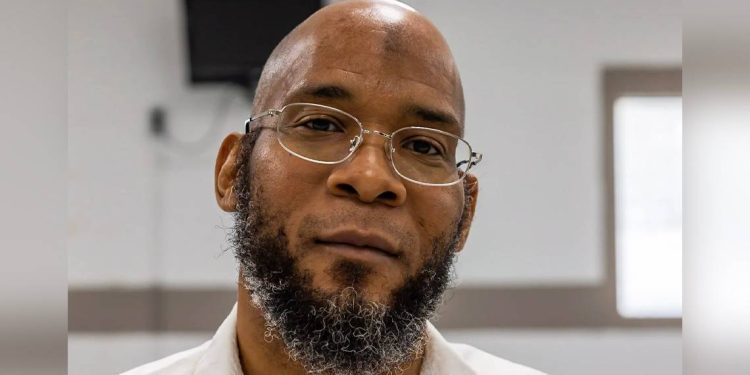Christopher Collings has just two weeks to live unless the U.S. Supreme Court or the governor of Missouri intervenes to stop his execution.
The 49-year-old’s attorneys have stated that, as the clock ticks toward 6 p.m. on Dec. 3, their client has been feeling anxious and scared. They argue that key details about his case should cause decision-makers to reconsider.
Collings allegedly confessed to the 2007 murder of 9-year-old Rowan Ford in southwestern Missouri. However, so did the girl’s stepfather, David Spears, now 42. Initially facing the death penalty, Spears was eventually convicted of lesser charges, including endangering a child and hindering prosecution. He was released from prison in March 2015 and now works for the state. He did not respond to requests for comment.
Along with raising doubts about Spears as an alternative suspect, federal public defenders Jeremy Weis and Daniel Kirsch question Collings’ confession to a police chief who allegedly misled officials about his own criminal past. The attorneys argue that these factors justify halting Collings’ execution, noting that if information about Spears and the police chief had been introduced during the 2012 trial, three jurors have said they would have voted against a death sentence.
Girl Found in Sinkhole Ford lived with her mother and Spears in Stella, Missouri, a small town about 40 miles south of Joplin.
On Nov. 2, 2007, Spears, Collings, and Nathan Mahurin were drinking at Spears’ house. That evening, they left the girl at home and went to Collings’ trailer to continue drinking, according to court documents.
Later, Mahurin drove Spears home, then returned to his own place.
When Ford’s mother came home from her overnight shift, she asked where her daughter was. Spears claimed Ford was with a friend, but he did not immediately report her missing. It wasn’t until later that day that the girl was reported as missing.
Spears lied about his whereabouts, and in a recorded conversation, he led investigators to a sinkhole. “It occurred to me, Fox Cave. If you’re going to hide a body, you’re going to drop it where outsiders wouldn’t know where to look,” a transcript from the conversation showed.
On Nov. 9, 2007, police found Ford’s body at the sinkhole, and she had been raped and murdered.
Spears was arrested and confessed. He told investigators that he had loaded her body into his mother’s Suburban and disposed of it in the sinkhole. He also stated that Collings was with him.
A cadaver dog indicated that the body had been in the Suburban.
During a Nov. 10, 2007, police interview, Spears described how Ford had been killed. “I have this vague memory of (Collings) handing me a white cord and telling me it has to be done,” he said.
Weis remarked that there is “a lot to suggest” that Spears played a significant role in Ford’s murder.
Officer Credibility Wheaton Police Chief Clinton Clark questioned Collings multiple times. Clark claimed Collings confessed during an unrecorded conversation on Nov. 9, 2007, on a bridge outside of town. This confession became a crucial part of the case at trial.
During court proceedings, Clark said he had provided Collings with a written Miranda waiver before the confession. However, according to Collings’ appeal, case records showed the waiver was signed at 3 p.m.—after the confession took place. A call log showed Clark and Collings had returned to the police station around 3 p.m., and two officers claimed to have seen Collings sign the form after returning from the bridge.
Prosecutors are required to disclose information that could undermine a witness’ credibility under the Brady rule.
Collings’ trial attorneys were told that Clark had faced an AWOL charge while serving in the U.S. Army. However, during Collings’ appeal, it was revealed that Clark had four AWOL convictions and had been sentenced to hard labor. Court documents state he was absent or in custody for 726 out of his 890 days in the military.
Collings’ attorneys argued that suppressing this information kept the defense from questioning the reliability of Collings’ confession and whether Clark should have even been allowed to serve as a police officer, as certain crimes disqualify someone from this position.
Kirsch added that Clark should have reported his military history to the Wheaton Police Department and the Missouri Department of Public Safety, which oversees the licensing of officers.
Katy Linnenbrink, the director of public information for the state public safety department, said each police officer’s license application is reviewed individually, considering both aggravating and mitigating factors. Under state statute, an officer can be disciplined for gross misconduct, moral turpitude, or reckless disregard.
Weis emphasized that the new information about Clark was vital, especially as it showed Clark had ignored the rules.
Wheaton Police Chief Clint Danforth said he was unaware of concerns about the Miranda warning’s timing and believed Collings went to Clark because he trusted him. Danforth, who had worked with Clark for two years before he retired due to health issues in 2018, called Clark “very honorable” and expressed frustration with the ongoing scrutiny over Clark’s past.
Clark passed away in 2020.
A Plea for Clemency Kirsch stated that Collings feels remorseful for his involvement in Ford’s death and has acknowledged causing harm.
Weis, who has represented Collings for about six years, described him as having an “engaging personality” and said that his relationship with his two daughters is especially important to him.
Collings’ legal team has submitted an application for a stay of execution to the U.S. Supreme Court and is also seeking clemency from Governor Mike Parson’s office. The governor has previously denied every request for a reprieve in death penalty cases. His office did not respond to a request for comment.
If Collings’ execution is carried out, it will be the fourth in Missouri this year, leaving eight people still on death row in the state.
Governor-elect Mike Kehoe’s campaign previously stated he would “uphold the rule of law” in death penalty cases.
